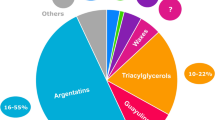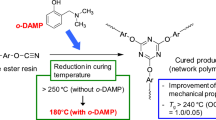Abstract
AQUEOUS suspensions of finely ground phenol formaldehyde, resorcinol formaldehyde and phloroglucinol formaldehyde resins gave potentiometric titration curves each of which showed an inflexion at a pH between 11.0 and 12.0. The amounts of phenolic hydrogen in the three resins indicated by these inflexions were in approximate agreement with the values, 893, 1,563 and 2,083 milliequivalents per 100gm. calculated from the formulæ, C6H2(OH)(CH2)1.5, C6H(OH)2(CH2)1.5, and C6(OH)3(CH2)1.5, of the repeat units contained in the three resins respectively
This is a preview of subscription content, access via your institution
Access options
Subscribe to this journal
Receive 51 print issues and online access
$199.00 per year
only $3.90 per issue
Buy this article
- Purchase on Springer Link
- Instant access to full article PDF
Prices may be subject to local taxes which are calculated during checkout
Similar content being viewed by others
References
Marshall, C. E., and Bergman, W. E., J. Amer. Chem. Soc., 63, 1911 (1941).
Author information
Authors and Affiliations
Rights and permissions
About this article
Cite this article
MITRA, R., DUBE, S. Acid Character of Some Phenolic Resins in Relation to their Structure. Nature 176, 79–80 (1955). https://doi.org/10.1038/176079a0
Published:
Issue Date:
DOI: https://doi.org/10.1038/176079a0
Comments
By submitting a comment you agree to abide by our Terms and Community Guidelines. If you find something abusive or that does not comply with our terms or guidelines please flag it as inappropriate.



